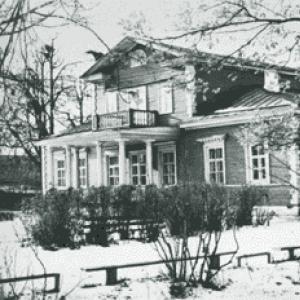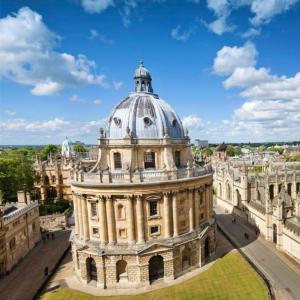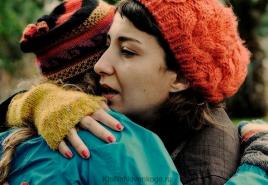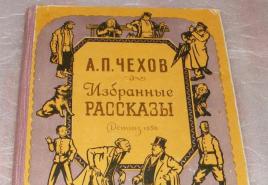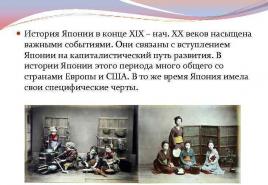Than famous and p Pavlov. Major achievements, contribution of Ivan Petrovich Pavlov to general psychology
Pavlov Ivan Petrovich (1849-1936), physiologist, author of exercise on conditional reflexes.
In 1860-1869. Pavlov studied in the Ryazan spiritual school, then in the seminary.
Under the impression from I. M. Sechenov "Brain Reflexes" he achieved from the father of permission to take exams in the St. Petersburg University and in 1870 entered the natural department of the Physics and Mathematics of Faculty. In 1875 he was awarded the gold medal for the work "On the nerves headed by work in the pancreas".
Having received the degree of candidate of natural sciences, he entered the third course of the Medical and Surgery Academy and graduated from her with honors. In 1883 he defended the thesis "Centrifugal nerves of the heart" (one of the nerve branches, going to the heart, now enhancing the nerve Pavlov).
Becoming in 1888 by Professor, Pavlov received his own laboratory. This allowed him to do without interference to study the nervous regulation in the selection of gastric juice. In 1891, Pavlov headed the physiological department in the new Institute of Experimental Medicine.
In 1895, he made a report on the activities of salivary dog \u200b\u200bglasses. "Lectures on the work of the main digestive glands" were soon translated into German, French and English and published in Europe. Labor brought Pavlov great fame.
For the first time, the concept of "conditional reflex", a scientist introduced a report on the congress of naturalists and doctors of the Northern Europe countries in Helsingfors (now Helsinki) in 1901. In 1904, the Nobel Prize was received for the digestion and blood circulation of Pavlov.
In 1907, Ivan Petrovich became an academician. He began to investigate the role of various brain departments in convention and reflex activity. In 1910 he saw the light of his work "natural science and brain".
The revolutionary shocks of 1917 Pavlov experienced very hard. In the comaus, his strength went to the preservation of the matter of life. In 1920, the physiologist sent a letter to the Council "on the free leaving of Russia due to the impossibility of conducting scientific work and the rejection of the social experiment produced in the country." The Council of People's Commissars adopted a resolution for signature V. I. Lenin - "In the shortest possible time to create the most favorable conditions for ensuring the scientific work of Academician Pavlov and his employees."
In 1923, after entering the light of the famous Labor, "the twenty years of experienced studying the highest nervous activity (animal behavior), Pavlov took a long passing trip. He visited the scientific centers of England, France and the United States.
In 1925, the physiological laboratory founded by him in the village of Koltushi, at the Institute of Experimental Medicine, the Academy of Sciences of the USSR was transformed into the Institute of Physiology. Pavlov, until the end of the life, remained his director.
In the winter of 1936, returning from Koltiusha, the scientist fell ill with the inflammation of the bronchi.
He died on February 27 in Leningrad.
Ivan Petrovich Pavlov, a brief biography of which we will be considered, - Russian physiologist, psychologist, laureate of the Nobel Prize. He was engaged in the processes of regulation of digestion, created a science of about all this, as well as a lot of other related to his name, we will talk in this article.
Origin and learning in Ryazan
On September 26, 1849, Ivan Petrovich Pavlov was born in Ryazan. A brief biography of him would be incomplete if we did not say a few words about his family. Father Dmitrievich, was a parish priest. Varvara Ivanovna, mother Ivan Petrovich, led a household. The photo below shows Pavlov's house in Ryazan, which is now a museum.
The future scientist began learning in the Ryazan spiritual school. After graduating from him in 1864, he entered the Ryazan spiritual seminary. Later, Ivan Petrovich with warmth recalled this period. He noted that he was lucky to learn from wonderful teachers. Ivan Pavlov met at the last course of the seminary with the book "Brain Reflexes" I. M. Sechenov. It was she who identified his further fate.
Moving to Petersburg to continue learning
In 1870, the future scientist decided to enroll at the Faculty of Faculty of the St. Petersburg University. True, Ivan Pavlov studied here only 17 days. He decided to translate to the natural branch of another faculty, physico-mathematical. Ivan Petrovich studied at Professors I. F. Tzion, F. V. Ovsyannikova. In particular, he was interested in the physiology of animals. In addition, Ivan Petrovich paid a long time to study the nervous regulation, being a true follower of Sechenov.
After graduation, I decided to continue learning Ivan Petrovich Pavlov. A brief biography of him was marked by the arrival at once on the third course of the Medical and Surgical Academy. In 1879, Pavlov finished this educational institution and began to work in the clinic of Botkin. Here Ivan Petrovich headed the laboratory of physiology.
Internship abroad, work in the clinic of Botkin and the Military Medical Academy

By the period from 1884 to 1886, its internship refers to Germany and France, after which the scientist returns to work in the clinic of Botkin. Pavlova in 1890 decide to make a professor of pharmacology and send to the Military Medical Academy. After 6 years, the scientist is already headed here by the Department of Physiology. He will leave it only in 1926.
Experiment with imaginary feeding
Simultaneously with this work, Ivan Petrovich studies the physiology of blood circulation, digestion, the highest nervous activity. It spends its famous experiment with imaginary feeding in 1890. The scientist establishes that the nervous system plays in the digestion processes a large role. For example, the process of juice occurs in 2 phases. The first of these is neuropsychotics, followed by humoral-clinical.
Study of reflexes, deserved awards
After that, I was carefully explored Ivan Petrovich Pavlov. A brief biography of it is complemented by new achievements. It has achieved significant results in the study of reflexes. In 1903, at the age of 54, he spoke at the International Medical Congress in Madrid with his report Pavlov Ivan Petrovich. The contribution to the science of this scientist did not remain unnoticed. For achievements in the study of digestion processes in the following, 1904, he was given the Nobel Prize.

A scientist in 1907 becomes a member of the Russian Academy of Sciences. London Royal Society in 1915 presents to him Coplis Medal.
Attitude towards revolution
Pavlov called the October Revolution of the Bolshevik Experiment. At first, he perceived changes with enthusiasm in life and wanted to see the completion of the started. He was considered in the West the only free citizen in Russia. The authorities treated favorably to a brilliant scientist. V.I. Lenin even signed a special decree in 1921 on the creation of conditions for the normal operation and life of Pavlov and his family.

However, after a while, disappointment came. The mass expulsion abroad of the outstanding representatives of the intelligentsia, arrests of friends and colleagues showed all the inhumanity of this "experiment". More than once, Ivan Petrovich performed from positions, impartial for the authorities. He shocked his speeches party leadership. Pavlov did not agree to "strengthen labor discipline" in the laboratory headed by him. He said that the scientific team cannot be equivalent to the factory, and mental work should not be depicted. In the Council, Ivan Petrovich's appeals began to receive the appeals to free the arrested, familiar to him, as well as stop terror, repression and persecution to the church in the country.
The difficulties that Pavlov had to face
Despite the fact that Pavlov did not take much of what was happening in the country, he always worked from all his forces for the benefit of the Motherland. His mighty spirit and will nothing could be broken. During the civil war, the scientist worked at the Military Medical Academy, where he taught physiology. It is known that the laboratory was not heated, so the experiments had to sit in the fur coat and cap. If there was no light, Pavlov operated with the lady (the assistant was held). Ivan Petrovich even in the most experienced years supported his colleagues. The laboratory survived due to its efforts and in the harsh 20s did not stop their activities.

So, Pavlov perceived the revolution as a whole negatively. He looved during the civil war, so repeatedly requested the Soviet power to release it from the country. He was promised to improve the material situation, but the power did very little in this direction. In the end, the creation of the Institute of Physiology (in 1925) was announced. This institute also headed Pavlov. He worked here until the end of his days.
In Leningrad in August 1935, the 15th World Congress of Physiologists was held. Pavlova elected his president. All scientists unanimously bowed before Ivan Petrovich. This has become a scientific triumph recognition of the enormous importance of its activities.
By the last years of life, Ivan Petrovich's trip is home to Ryazan. Here he was also met very friendly. Ivan Petrovich was arranged a solemn reception.
Death of Ivan Petrovich
Ivan Pavlov died in Leningrad February 27, 1936. The cause of death is the aggravated pneumonia. He left behind the many achievements about which it is worth talking separately.
Basic achievements of scientist

The works of Ivan Petrovich Pavlova on the physiology of digestion, who deserved the highest international recognition, served as an impetus for development in the physiology of the new direction. We are talking about the physiology of the highest nervous activity. By this area, the scientist Pavlov Ivan Petrovich devoted about 35 years of his life. It is the creator of the method of studying the mental processes occurring in the body of animals, with the help of this method led to the creation of the teachings on the mechanisms of the brain and the highest nervous activity. In 1913, a building with two towers was built to carry out experiments related to conditional reflexes, which were called "Silence Tower". Here, three special cameras were equipped with three special chambers, and since 1917 five more came to construction.

Another opening of Pavlova Ivan Petrovich should be noted. His deserves are the development of the teaching on what exist, the doctrine of the teaching on (a complex of reactions to those or other stimuli) and other achievements are also.
Pavlov Ivan Petrovich, whose contribution to medicine is difficult to overestimate, in 1918 he began research in a psychiatric hospital. On his initiative, in 1931 was created at the department and clinical base. I. P. Pavlov Since November 1931, he conducted scientific meetings in psychiatric and nervous clinics - the so-called "clinical environments".
These are the main achievements of Ivan Petrovich Pavlov. This is a great scientist whose name is useful to remember.
Academician Ivan Petrovich Pavlov - Soviet physiologist, creator of materialistic teaching on higher nervous activity and modern ideas about the digestive process.
From Russian scientists, he was the first to be awarded the Nobel Prize in 1904 for many years of labor on the study of digestive mechanisms. I. P. Pavlov studied the nature of the secretion of the main digestive glands when digesting various types of food and the participation of the nervous system in the regulation of the digestive process, re-creating the physiology of digestion. To do this, he had to develop a whole series of ingenious operations that allowed not disturbing digestive processes, to see what happens in the digestive bodies hidden in the depths of the body.
I. P. Pavlov made an important contribution to many sections of physiology, including in the physiology of the cardiovascular system, examining the peculiarities of reflex regulation and self-regulation of blood circulation. His main merit is the study of the functions of large hemispheres of the brain, the creation of a teaching about the highest nervous activity. In the course of these studies, Pavlov opened a special type of reflexes formed in animals in an individual life. Subsequently, they were called conditional reflexes. On the one hand, conditional reflexes are physiological reactions and can be studied by physiological methods, and on the other - an elementary mental phenomenon.
No physiologist of the world was so famous as Pavlov. He was elected a member of the Sciences Academies of 22 countries and an honorary member of 28 scientific institutions.
After the Great October Socialist Revolution, the Council of People's Commissars issued a special decree, signed by V. I. Lenin, about creating conditions for ensuring scientific research as a completely exceptional, which is of great importance. In Leningrad, a physiological institute was organized, and in the village of Koltushi - the biodeancia, which gained fame as the "capital of conditional reflexes".
An outstanding scientist brought up a huge army of students and followers. From the face of the physiologists of our planet, gathered in 1935 in Leningrad to the World Congress, Pavlov was awarded the title "Elders of Physiologists of the World". In the same year, referring to young people, Ivan Petrovich wrote: "Remember that science requires the whole of his life." All his life is confirming these words.
I. P. Pavlova remembers not only as a great scientist, but also as a fighter for peace all over the world. Congress delegates from 37 countries standing applauded him when he, opening the meeting, turned to one and a half thousand students with a passionate appeal to glue the war as the most shameful phenomenon of human life. "... I am happy," the scientist said, "I am happy that the government of my great homeland, struggling for the world, for the first time in history proclaimed:" Not a foy of someone else's land ... "
All the work of Pavlov was imbued with hot love of his homeland. "No matter what I do," he wrote, "I constantly think that I serve it, how much my forces allow, above all to my Fatherland, our Russian science."
No physiologist of the world was so famous as Ivan Petrovich Pavlov, - the creator of materialistic teaching about the highest nervous activity of animals and man. This teaching is of great practical importance in medicine and pedagogy, in philosophy and psychology, in sports, work, in any human activity - everywhere it serves as the basis and starting point.
The main directions of the scientific activity of Pavlov - a study of the physiology of blood circulation, digestion and higher nervous activity. The scientist has developed the methods of surgical operations to create an "isolated ventricle" and the imposition of fistula digestive glands, applied a new approach for its time - "Chronic experiment", which allows observations on practically healthy animals in conditions as close as possible to natural. This method allowed to minimize the distorting effect of "acute" experiments requiring serious surgical intervention, separation of parts of the body and anesthesia of the animal. Using the "insulated ventricle" method of Pavlov set the presence of two phases of juice: nervous and reflex and humoral clinical.
The next stage in the scientific activity of Ivan Petrovich Pavlova is the study of higher nervous activity. The transition from the work in the field of digestion was due to its ideas about the adaptive nature of the activity of digestive glands. Pavlov believed that adaptive phenomena are determined not just reflexes from the oral cavity: the reason should be sought in mental excitation. As new data on the functioning of external brain departments, a new scientific discipline was formed - the science of higher nervous activity. It was based on the idea of \u200b\u200bthe separation of reflexes (mental factors) on conditional and unconditional.
Pavlov and his staff discovered the laws of education and the extinction of conditional reflexes; They proved that conditionaloreflex activity is carried out with the participation of the bark of large hemispheres of the brain. In the cortex of large hemispheres, the braking center was opened - antipode of the excitation center; various types and types of braking (external, internal) are investigated; The laws of distribution and narrowing the scope of the excitation and braking are the main nervous processes; Sleep problems are studied and its phases are installed; The braking is investigated; The role of the collision of the processes of excitation and braking in the occurrence of neurosis was studied.
Pavlov's wide fame brought his teaching about the types of nervous system, which is also based on ideas about the ratio between the excitation and braking processes.
Finally, another merit of Pavlova is the doctrine of signaling systems. In a person, in addition to the first signaling system inherent in the same way and animals, there is a second signaling system - a special form of higher nervous activity associated with speech function and abstract thinking.
Pavlov was formulated by the ideas about the analytical synthetic activities of the brain and created the teaching on analyzers, the localization of functions in the cerebral cortex and the system in the work of large hemispheres.
Ivan Petrovich Pavlova's scientific creativity has had a huge impact on the development of related areas - medicine and biology, left a noticeable trace in psychiatry and psychology. Under the influence of his ideas, large scientific schools were formed in therapy, surgery, psychiatry, neuropathology. Psychology Nervous Pavlov
In 1904. Ivan Petrovich Pavlov was awarded the Nobel Prize for research of digestive mechanisms.
In 1907 Pavlov was elected a member of the Russian Academy of Sciences; Foreign member of the Royal Society of London.
In 1915. He was awarded the Coplis Medal of London Royal Society.
In 1928. He became an honorary member of the London Royal Society of Doctors.
In 1935.at the age of 86 (!) Years, Pavlov presided over the sessions of the 15th International Physiological Congress, held in Moscow and Leningrad.
Analysis of the biographical creative path of Ivan Petrovich Pavlova
As I read different biographies of Ivan Petrovich, in my imagination the image of an icebreaker, a tank, which is pierced through the debris, ice, alive, leading people as a tug of caravan of ships. The feeling of inexhaustible energy driving the key from this great man, the feeling of unshakable power, closely intertwined with passion for science. A man with a sense of self-esteem, a brilliant thinker, he at the same time was very modest, not tolerant of his homeland in front of him.
It seems that do not circumstances, not surrounding people formed him as a scientist, and he himself! Essentially at the expense of its hard work, perseverance in achieving the goal, his fervent love for physiology. Moreover, by its example, promotion, Ivan Petrovich helped the formation of many other scientists.
Pavlov Ivan Petrovich became known to us primarily as a physiologist, a well-known scientist who created the science of higher nervous activity, which has a huge practical value for many sciences. This is medicine, and psychology, and physiology, and pedagogy, and not just the Pavlov dog, which reacts to the light bulb with the reinforced flow of saliva. For their merit, the scientist was awarded the Nobel Prize and his name were named some educational institutions, scientific institutions. Pavlov's books and in our time are published rather large circulations. Those who are not familiar with the achievements of the scientist and does not know who Ivan Petrovich Pavlov, a brief biography will help fix this omission.
The future shone was born in Ryazan, in the family of the clergy, in 1849. Since Pavlov's ancestors were "clergy", the boy was forced to go to the spiritual school and in the seminary. About this experience, he subsequently spoke with warmth. But by chance after reading the book of Sechenov about the brain reflexes, Ivan Pavlov left training in the seminary and became a student at the Physics and Mathematics Faculty in St. Petersburg.
After graduating from the course with honors, he received a scientific degree of a candidate of natural sciences, and decided to continue his studies at the Medical and Surgery Academy, with the end of which he received a leek diploma.
From 1879, Ivan Petrovich became the head of the laboratory under the clinic of Botkin. It was there that he began his digestive research, which lasted for more than twenty years. Starting a young scientist defended his thesis and received the appointment of Privat-Associate in the Academy. But the offer from Heidenhain and Karl Ludwig, quite famous physiologists, to work in Leipzig seemed more interesting to him. Returning in two years to Russia, Pavlov continued to scientific activities.
Already by 1890, his name became famous in scientific circles. Simultaneously with the management of physiological studies at the Military Medical Academy, he also led the physiology department at the Institute of Experimental Medicine. The scientific work of the scientist began with the study of the heart and blood system, but later the scientist devoted himself to the study of the digestive system. By many experiments, white spots in the structure of the digestive tract began to disappear.
The main experimental scientists were dogs. Pavlov wanted to understand the mechanism of the pancreas, and make the necessary analyzes of its juice. For this, by samples and mistakes, he brought out a part of the pancreas, and created the so-called fistula. Through the hole, the pancreas juice fell out and was suitable for research.
The next step was the study of gastric juice. The scientist was able to make a fistula of the stomach that before no one could have. Now it was possible to explore the extraction of gastric juice, its number and qualitative indicators depending on the characteristics of food.
Pavlov made a report in Madrid and there marked the main milestones of his teaching. A year later, writing scientific work about its research, the scientist was awarded the Nobel Prize in 1904.
Next, which attracted the attention of the scientist, the body's reaction, and the digestive system, including, on external stimuli. It was the first step to the study of conditional and unconditional connections - reflexes. It was a new word in physiology.
Reflexes have many living organisms. Since a person has a greater historical experience, its reflexes are richer and more difficult than those of the same dogs. Thanks to Pavlov's research, it was possible to trace the process of their formation and understand the basic principles of the cerebral cortex.
There is an opinion that in the post-revolutionary period, in the years of "destroyed" Pavlov was beyond poverty. But nevertheless, remaining a patriot of his country, he refused a very profitable sentence to move to Sweden for further scientific activities with one hundred percent financing.
Some researchers believe that the scientist simply had no opportunity to go abroad, and he filed an end to the resolution of emigration. After a while, in 1920, the scientist finally received the promised institute from the state, where he continued his research.
For its research, the top of Soviet power was observed, and thanks to this protection, the scientist was able to fulfill his long-standing dreams. At its institutions, clinics equipped with new equipment were opened, the staff of the staff was constantly expanded, the financing was wonderful. Since that time, regular publication of Pavlov's works has also begun.
But the health of the scientist in recent years has left much to be desired. Several times he had overdone with the inflammation of the lungs, he looked unhealthy, he was very tired and did not feel very well. And in 1936, after a cold, which passed into the next inflammation of the lungs, Pavlov died.
It may well be that today's medicinal products would have done with the disease, but then medicine was still at a low level of development. The death of the scientist has become a major loss for the entire scientific world.
Pavlov's contribution to science is impossible to overestimate. He brought into one plane physiology and psychology, his research of the highest nervous activity gave impetus to the development of different sciences. The name of Ivan Petrovich Pavlova is now familiar to every educated person. At this presentation of the life and work of the scientist, I consider it possible to complete, because the brief biography of Pavlova I.P. Just illuminated.

